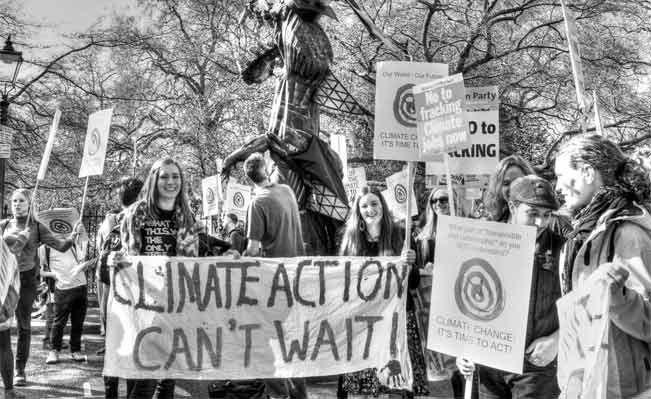 Climate action can't wait! — with Brittany Robson, Marianne Brett and Annika Günther.Image source:Rebecca Brownlow
Climate action can't wait! — with Brittany Robson, Marianne Brett and Annika Günther.Image source:Rebecca Brownlow
On March 7th more than 20,000 people marched in London against climate change. Elaine Graham-Leigh reports
The Time to Act demonstration in London on Saturday 7th March sent a loud and clear message to this government – and to the next – that we won’t stand for any more inaction on climate change. With 20,000 people turning out for the march to Westminster, this was the largest demonstration organised by the Campaign against Climate Change to date and a real sign of an upturn in the movement.
The aim of the demonstration was to put pressure on the government ahead of this year’s climate talks in Paris. These are widely recognised as our absolute last chance to put measures in place to keep warming below the 2C threshold, beyond which life as we know it on this planet would become unrecognisable. That we cannot rely on our governments to implement meaningful cuts to carbon emissions without this pressure is obvious. On the day of the march, a team led by the economist Lord Stern published a report showing that the emissions cuts proposed for consideration in Paris would be insufficient to avert climate disaster.
Climate change has been an issue for longer than many of Saturday’s demonstrators have been alive, but the urgency with which we now have to force real action from governments apparently determined to continue to offer only greenwash is undoubtedly encouraging more and more to take to the streets. The Time to Act demonstration after all comes after the impressive People’s Climate March on 21st September 2014, which saw 40,000 people demonstrate in London and an unprecedented 400,000 in New York, as part of the biggest global climate demonstration in history.
Saturday’s march also showed a growing understanding that the fight against climate change and the fight against austerity are linked, with many ‘No Cuts’ placards giving it a distinctly anti-austerity edge. The ideology which will not countenance a government programme to create a new, green power generation infrastructure, despite a number of studies showing that we could feasibly fulfil all our power needs from renewables, is the same ideology which pushes privatisation and cuts to public services. Only a government which turns its back on austerity and the rule of the private sector can implement the changes we need to deal with climate change before it is too late.
The People’s Assembly against Austerity was one of the organisations supporting the march and will be keeping up the pressure after the election with an anti-austerity demonstration in London on 20th June. Politicians of all stripes in Westminster can be under no illusions – the movement against the system that has created the climate and the economic crisis is here to stay, and it is growing.

